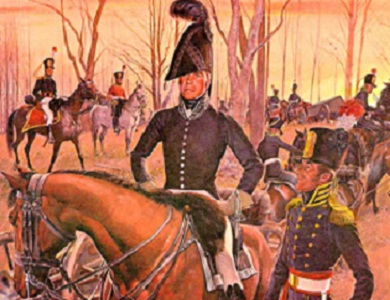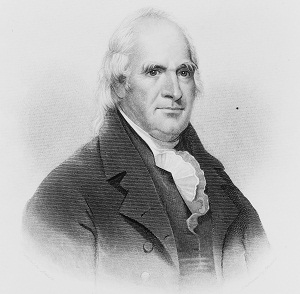On June 1, 1812, Madison came forward with a definitive list of unredressed grievances against Great Britain. These included impressment of US seamen on the Atlantic (forcing sailors to serve aboard British warships), the despised Orders in Council, and incitement of Indians against frontier positions. The House Foreign Affairs Committee met and agreed that London’s hypocrisies could no longer be tolerated.
"Mr. Madison is wholly unfit for the storms of war." Henry Clay, Kentucky statesman and Speaker of the House of Representatives
Mr. Madison's War?

US Army Center for Military History
The long period of anxious anticipation ended, as both houses of Congress voted for war that same month. The tally was 79 to 49 in the House, 19 to 13 in the Senate (some days later, and only after extended debate).
It was not a war for which enthusiasm could be retained long. The only obvious cause in the minds of most people was the British insult to America’s honor. According to Federalist New England, Madison had fabricated a threat of invasion when none existed; he was prepared only for a “Quixotic expedition” into Canada, on the basis of flimsy evidence that the nation was even under attack. London, the Federalists said, was eager to resolve differences and would modify its position on impressment—that insult to America’s honor. This was, in fact, partly true. The British wanted to avert a war with the United States. The Orders in Council were to be repealed. Had the administration waited a little longer, the expensive war might have been averted.
Not all Federalists lived in the north. Those south of the Mason-Dixon line noted that the war would reverse Secretary Gallatin’s good work in pointing the United States toward a balanced budget and retirement of the national debt. The war hawks, bent on reclaiming honor yet staunchly opposed to taxes, seemed strangely unconcerned about the road they were taking. The Federalists had not won the presidency since John Adams had faced Thomas Jefferson in 1796. If enough Americans were killed in combat, they figured, they could replace Madison with one of their own.
A Challenge and a Referendum

Painted by Ames; engraved by Buttre The Library of Congress
It had been the Republicans’ routine to geographically balance the ticket: a Virginia president accepted a New Yorker as his running mate. But in April 1812, Vice President George Clinton died in office. His nephew, DeWitt Clinton, decided to challenge the incumbent, rallying two unlikely constituencies: Republicans in Congress who were not keen on the war, and Federalists who could be convinced that they had no national base left and would be better served by electing the putative Republican Clinton—at least he was not a southerner, and he could be reasoned with.
The presidential election that took place in the fall of 1812 was a referendum on the war. Madison was in his sixtieth year, and Clinton, forty-three, was brimming with confidence and working hard at cementing a coalition of fellow New Yorkers and disaffected New Englanders. In the end, however, populous Pennsylvania went for Madison and the solid South returned him to office. Clinton had won seven of the eighteen states but none south of Delaware. The Republicans turned to Elbridge Gerry of Massachusetts as vice president. Though Gerry and Madison had experienced moments of contention at the Constitutional Convention, they were politically compatible these many years later.
As a reminder of the uncertainties in national politics in this first year of a renewed fight with Great Britain, war hawk Henry Clay confided to Caesar Rodney, who had resigned as attorney general of the United States some months before war was declared: “Mr. Madison is wholly unfit for the storms of war.” And storms he would face.
Part of a series of articles titled Madison, Party Politics and the War of 1812 .
Last updated: March 6, 2015
